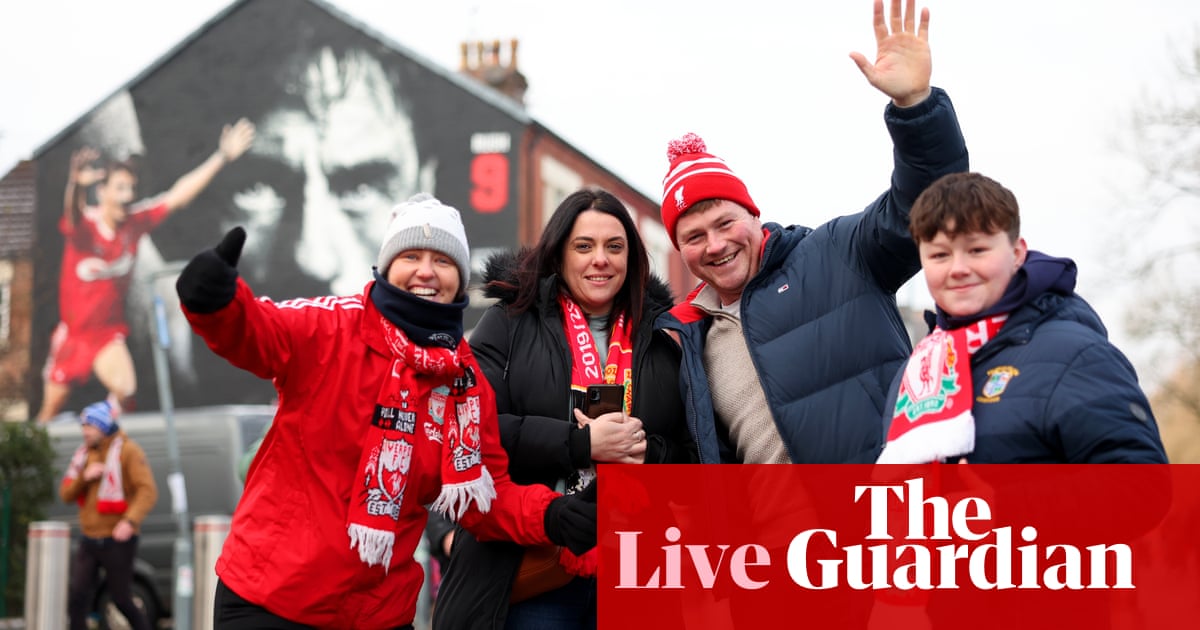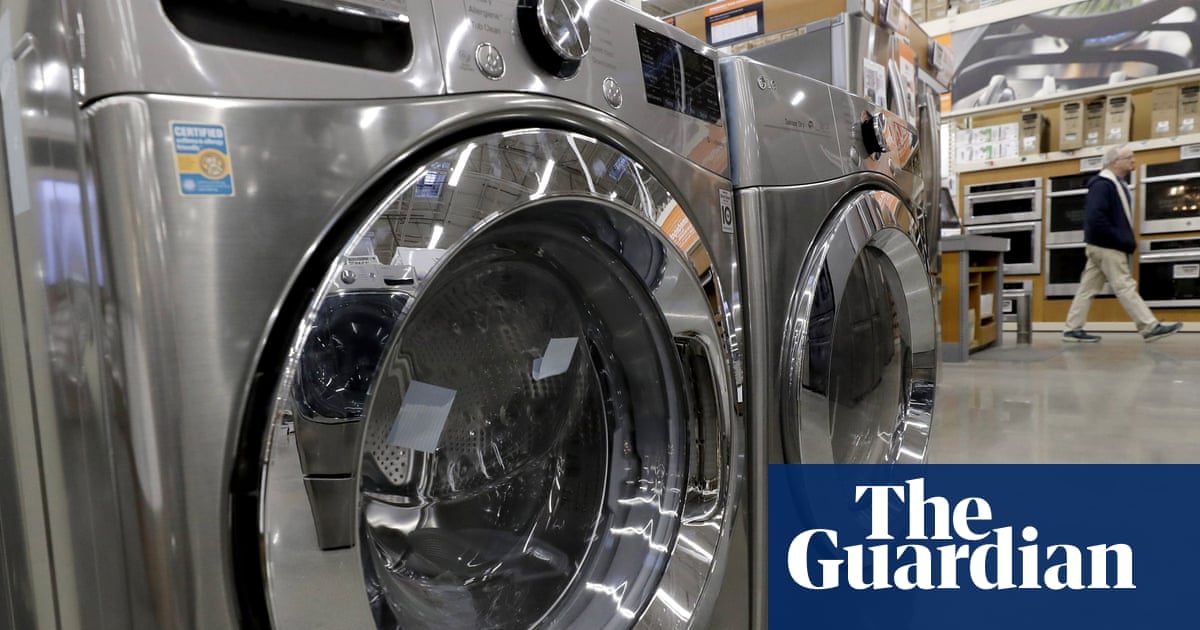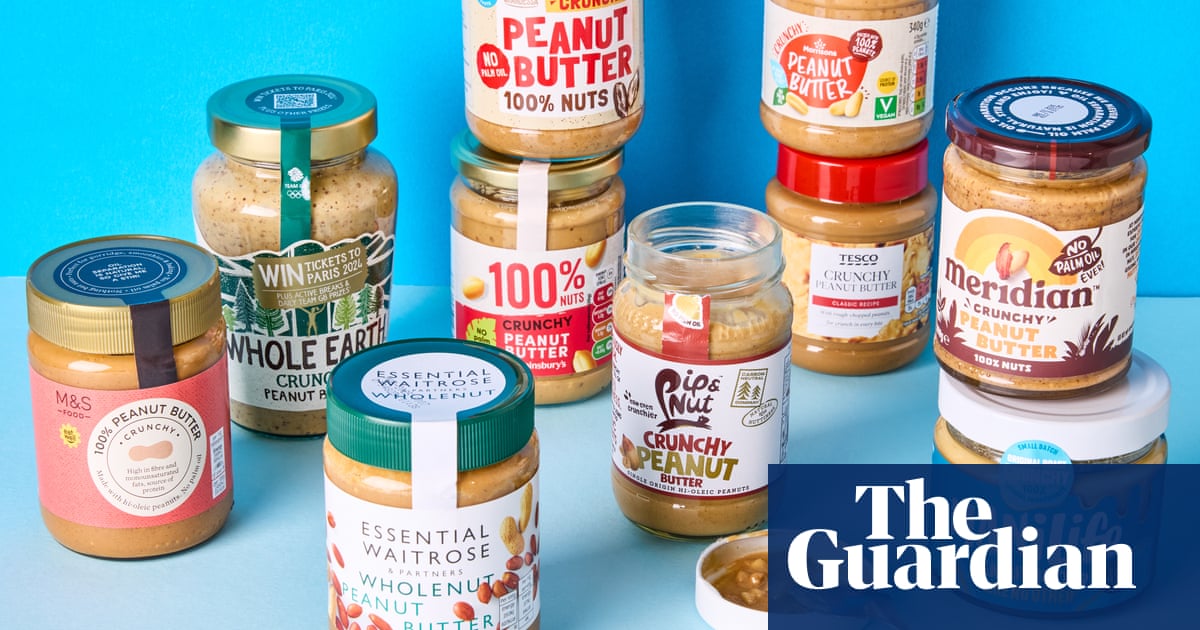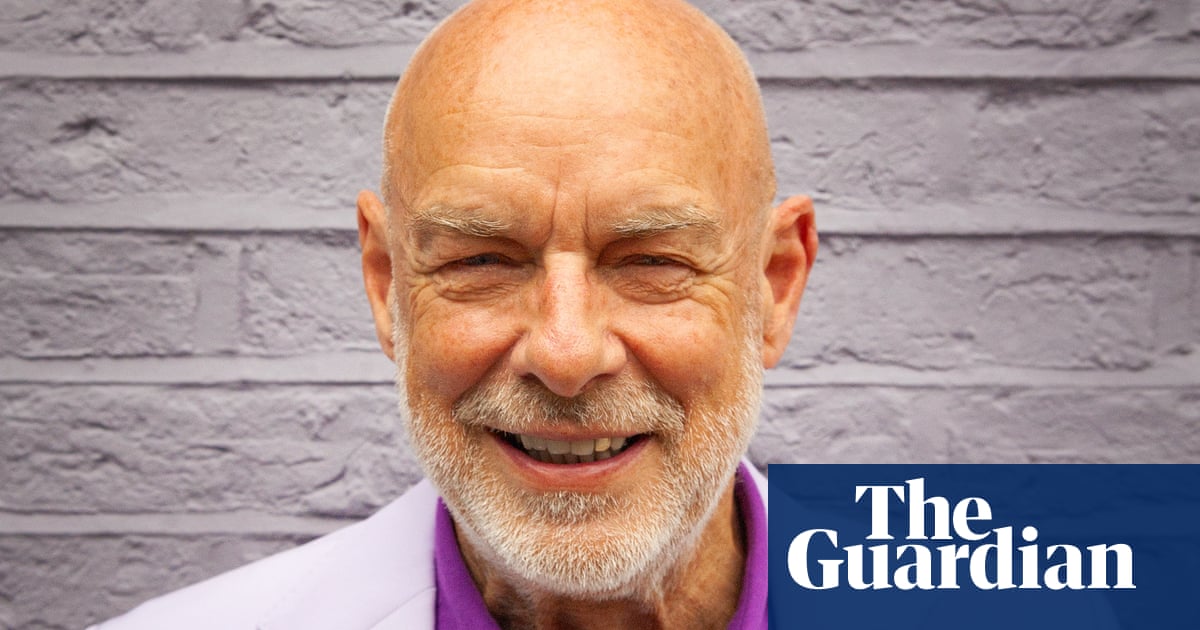A modern Christmas without a LadBaby charity single, some might say, is like sausage meat without the pastry, but it’s something we now have to adjust to. Between 2018 and 2022, Mark and Roxanne Hoyle, the husband-and-wife team behind the social media brand LadBaby, had the Christmas No 1 – for such things still matter – sewn up. With their fifth, they broke the record set by the Beatles. One year, they collaborated with Elton John and Ed Sheeran. Then last year, they decided they’d had enough. What had started as a joke, and a way to raise money for the food bank charity the Trussell Trust (now known as Trussell), had become more successful than they’d ever thought possible.
It also came with a backlash, after allegations spread online that the Hoyles were pocketing the money. They received a deluge of online abuse, threats in public and blackmail attempts. They were labelled grifters and, worse, Tories (in a 2019 Guardian interview, they had declined to say how they voted). Mark started experiencing panic attacks, something he still lives with. Now they’ve written a memoir, Our LadBaby Journey, detailing much of this, and it seems a bit of a cautionary tale – what happens when two ordinary people become online celebrities, and some silly Christmas songs about sausage rolls end with threats and the police involved.
Writing the book, says Roxanne, was “like therapy, getting it out on paper”. It also made them realise what they had achieved, she says. They have built a brand with 13 million followers across several social media platforms, by posting funny videos of themselves. They have paying subscribers who join them live three times a week. They’ve written children’s and parenting books, created a game and do a podcast (we’re talking via video call, the couple in the attic room in their Nottingham house where they record it). As content creators, says Roxanne, it’s always about “what’s next, what’s next – and social media is so fast, I don’t think we ever really celebrated or took in how big it was”.

Mark, 37, started LadBaby in 2016 as a Facebook page. At the time, Roxanne, 40, was pregnant and Mark was working as a graphic designer in advertising. The first of his friends to become a father, he felt he wasn’t getting what he needed from the online parenting influencers. “I was like, I want to read the bloke that owns a chippy and has three kids, the everyday bloke that’s talking about being a dad. So I set up this blog, and I hoped to meet people like me.” The height of his ambition, he says, was to get noticed by a baby brand and get some free nappies out of it.
They were struggling financially. Roxanne had worked as an art director in advertising, but had given up work to look after their son because childcare costs were too high. But she had been the higher earner, and now they were trying to survive on Mark’s single salary. After all the bills had been paid, they budgeted £20 a week for food. “I’d go round Aldi with a calculator,” she says. Once, she accidentally went 70p over and couldn’t pay for her shopping; a man in the queue gave her a pound. Mark says it was very difficult to deal with at the time. He turns to his wife. “I don’t think I truly shared with you how it made me feel, because I didn’t want it to look like I wasn’t coping. But I was terrified. I was the only one bringing the money, and it wasn’t enough.” Laughter, he says, was vital. “You’d try to make a joke – it’s what my family did when I was little, and it’s always got us through everything.”

The early LadBaby was just Mark posting photos with captions, and although he got approximately 1,000 followers, it felt as though it was going nowhere. Just when he was considering giving up, he made a video, having never had the confidence before – a lasting effect, he thinks, of the severe bullying he experienced as a child. “I was, like, ‘I hate the sound of my own voice, I hate how my teeth look, it’s never something I’ll do.’ I think that’s what LadBaby did for me personally: it helped with my confidence.” The video he made using a free editing app (the same one he still uses), in which Mark got a £4 toolbox to use as his son’s lunchbox, went viral. So did others. Still, it was two years before he finally gave up his graphic design job to concentrate on LadBaby full-time. By then, thanks to the way content creators could monetise their videos, it looked as if they could earn more in a month than he had in a year.
The number of followers kept growing. Nothing prepares you, says Roxanne, for becoming internet famous. “There’s no manual or education on how to deal with that,” she says. Mark adds: “No one tells you what to do or how to do it, or how to navigate getting recognised on the street. That was something we’ve had to learn on the job. We were a bit naive in the beginning, especially with privacy and how much we put online.” At their house in Hemel Hempstead, he would film their street and front door. “I think we never expected as many people to be watching,” he says.
The Hoyles say they want privacy for their children, but their two sons still appear in their content. Do they ever regret having started that? “We’re always reviewing it,” says Mark. “We let them judge whether or not they want to be involved – we don’t force them. That’s why you’ll see our oldest more than our youngest online.” Roxanne says she doesn’t regret it, “because my sons have experienced things they would never have experienced if me and Mark hadn’t started LadBaby. My kids have wonderful things because of what we created and they have these lovely video memories of us as a family. But they are made aware of how many people there are in the world who watch Mummy and Daddy.” Has it not given their children a warped view of how to act when they see a phone in the vicinity? “I don’t think so,” says Mark. Their younger son, especially, hates having his photo taken. “So he definitely doesn’t feel the expectation to turn it on for cameras.”
At their previous house, someone had put their address on Google maps, and people started turning up. “It was frightening,” says Mark. Online popularity is different from the kind of fame the general public recognise and when they reported it, the police didn’t seem to take it seriously. Their only advice was to stop posting videos. The couple ended up moving to Nottingham, where Mark grew up.
Online fame is even harder for younger people to deal with, he says. For many, the dream is to become an influencer and make a lot of money from content, but it comes with pressure to create more and more, and abuse is inevitable. “We were lucky that we had internet success when we were married with a mortgage and a kid, because a lot of people that get into social media, they’re like 17, 18, and they haven’t worked lots of jobs or seen the real world or had responsibility.” Both have met people who define themselves by their follower count. “They’ll go, ‘I’m 8 million,’” says Mark.

Early on, both would get horrible comments about the way they looked. “It’s hard sometimes,” says Roxanne, who has had endless commentary on her weight. “It does affect me, but I’ve become more resilient. I remember someone saying, ‘Your team must have to deal with trolling and read all the comments.’ What they didn’t realise is, we don’t have these teams that some people have.” To succeed as a social media star, Mark points out in the book, you have to want to be liked. “There’s a reason why it’s a like button, right? Inevitably, when you put something out there, you are wanting people to like it. I know people put things out to cause controversy, but we don’t.”
They had been largely celebrated when their first Christmas single had been released in 2018, a cover of Starship’s We Built This City, rewritten about sausage rolls to raise money for Trussell (Roxanne’s mother was a food bank volunteer). But by the time their fourth single, this time with Elton John and Ed Sheeran, was announced, the abuse had ramped up. A story spread that the Hoyles were taking some of the charity money. Even though Trussell stepped in and said it wasn’t true, the allegations stuck.

Another criticism was that they had used the charity single as a way to promote and build their own brand. It happened concurrently, says Mark, “and I think there were a lot of misconceptions around money. I really struggled with that, because it’s one thing people going, ‘We don’t like your teeth, we don’t like your voice.’ But when there’s this narrative going around that we stole the money and we profited from it, it was really difficult to take.”
They had also remained staunchly apolitical. “Our channels are just about doing silly videos and making people laugh,” says Mark. “It’s never about taking a side in politics, in religion. It’s not really our place. We just want it to be a fun, positive place.” But for the record, he says, they both vote Labour. “I’ve always voted Labour. I come from a working-class background, I voted Labour at every election.”
In the years that food bank use has exploded, poverty in the UK has been largely blamed on the Conservative government’s brutal austerity policies. Trussell has been seeing its highest levels of need, and provided 3.1m food parcels in the past year, a rise of 94% over five years. As well as raising awareness and money, couldn’t the Hoyles have used their platform to criticise the reasons they were needed in the first place?
“I’m not an expert to do that,” says Mark. “For me, it was about helping families. That’s how we can make a difference. We can raise awareness and try to raise money.” Roxanne points out that the abuse had become intolerable. “I don’t think people realise the impact of that level of trolling, where the police came to support us through that time.” There is no way she would have had the confidence, she says, to start sharing her opinions about the government.
It probably would have been better to have denied the financial allegations more strenuously, says Mark. “But we were scared,” adds Roxanne. People were sending threats, saying they knew where they lived. Mark was threatened in a pub, and had to be bundled into a taxi by the bouncers. “We didn’t know how to [handle] it,” says Mark. “And quite often, you don’t want to make the situation worse, and so you don’t do anything.” Mark started experiencing panic attacks. Eventually, the police did start to take the threats seriously, and at one point the Hoyles had anti-terror officers at home advising them.
In 2022, the couple were sent a video by someone who claimed it showed Mark groping a woman in a Nottingham bar, and demanded £10,000 to prevent it being released. They ignored it and the video was posted to social media a few months later, then picked up by the press. In their book, they insist the man in the grainy video is not Mark. How did they cope with all that? “Not well,” says Roxanne with a grim laugh. “Not well,” repeats Mark. “We were lucky we had each other – that’s what we’ve always said about LadBaby, the good and the bad.” Roxanne adds: “We’ve been accused of things before, and we’re just like, we’ll get through this one. That’s how we are now – we’re quite resilient people.”

Mark still has panic attacks. “I think I always will, but I’m better at dealing with them now. I can see them coming, I understand how they are.” Roxanne says she is sad that people still question their motives when it came to fundraising. “I’m devastated we’re not doing another song, because those songs shouldn’t have been about trolling and controversy,” she says.
At some point, if an influencer or content creator gets big enough, they start making money, and this can change the dynamic with their followers, especially if, like the Hoyles, they built their brand on the idea they were ordinary people – and anti-poverty fundraisers. In the book, Mark admits he was nervous about how their new, bigger house would go down with their audience. Roxanne insists they haven’t changed. Their audience, she says, has “grown with us and seen us evolve into these two people, and I like to think we’ve remained true to who we are”.
But it remains a tricky balance. I wonder how much class plays into it – there are, after all, plenty of middle-class influencers who monetise their audience and sell products, but who don’t, I suspect, attract the same vitriol. Is there more criticism of working-class influencers?
“Not necessarily creators as such,” says Mark, “but I think it’s harder for working-class people to break into a lot of industries. I struggled at university [both were the first of their families to go]. I struggled in advertising.” They have experienced snobbery from the publishing and music industries. “We get it,” says Roxanne. “We’re not credible music artists, but it was sad because a lot of people could have helped the charity.” Even now, at events they might go to, “there are still people that won’t want you there, that don’t believe you’ve worked for it, that don’t believe you are [proper] authors, or that you are naturally good at making videos”. It doesn’t bother them, she says. “It’s been a fantastic adventure and I’m proud of that.”
This is the time of year they would be finishing their Christmas song, but they insist they won’t be bothering the charts any time soon. Although, says Roxanne, Christmas 2028 will be the 10-year anniversary of the first single. She just needs to convince her husband. “It needs to be a sausage roll megamix.”

.png) 2 months ago
22
2 months ago
22













































